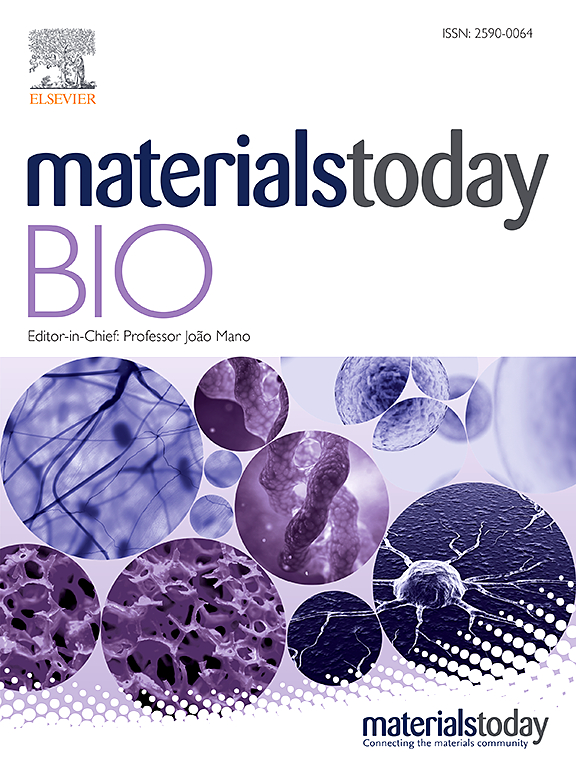Colonization of engineered bacteria enhanced lipid nanomedicine accumulation in tumors for sonodynamic immunotherapy
IF 8.7
1区 医学
Q1 ENGINEERING, BIOMEDICAL
引用次数: 0
Abstract
Lipid nanoparticles (LNPs) demonstrate liver-accumalating properties, enhancing drug delivery to hepatic tissues. This localized enrichment reduces systemic toxicity and mitigates drug resistance. However, critical limitations such as off-target effects, rapid clearance, and poor specificity hinder their clinical translation. Inspired by the tumor-targeting ability of bacteria, we constructed a multifunctional engineered bacteria system combining LNPs with probiotics by electrostatic adsorption. Specifically, the surface of Bifidobacterium longum (BL) was modified with sorafenib-loaded LNPs (designated PSI LNPs), enabling precise delivery of lipid nanomedicines to tumor sites. Meanwhile, ultrasound irradiation facilitated drug release and improved efficacy. On the one hand, we used fluorescence imaging to observe and monitor live-engineered bacteria. Compared to the single PSI LNPs group, the tumor accumulation of lipid nanomedicines loaded with engineered bacteria exhibited a 66 % increase. The results demonstrated that the engineered bacteria not only augmented the accumulation of nanomedicines but also prolonged the retention time for a sustained effect on the tumor. On the other hand, we further explored synergistic immune system activation by Bifidobacterium and sonodynamic therapy, which stimulated dendritic cell maturation, T cell infiltration, and CD8+ T cell activation. In conclusion, this delivery strategy of engineered bacteria targeting the tumor microenvironment is expected to overcome the limitations of conventional LNPs and provide a promising approach for treating hepatocellular carcinoma.
工程细菌的定植增强了脂质纳米药物在肿瘤中的积累,用于声动力免疫治疗
脂质纳米颗粒(LNPs)具有肝脏蓄积特性,可增强药物向肝组织的传递。这种局部富集降低了全身毒性并减轻了耐药性。然而,脱靶效应、快速清除和特异性差等关键限制阻碍了它们的临床转化。受细菌肿瘤靶向能力的启发,我们采用静电吸附的方法构建了LNPs与益生菌相结合的多功能工程菌体系。具体来说,长双歧杆菌(BL)的表面被索拉非尼负载的LNPs(称为PSI LNPs)修饰,使脂质纳米药物能够精确地递送到肿瘤部位。同时超声照射促进药物释放,提高疗效。一方面,利用荧光成像技术对活工程菌进行观察和监测。与单PSI LNPs组相比,负载工程细菌的脂质纳米药物的肿瘤积累增加了66%。结果表明,工程细菌不仅增加了纳米药物的积累,而且延长了纳米药物的滞留时间,从而对肿瘤产生持续的作用。另一方面,我们进一步探索双歧杆菌和声动力疗法的协同免疫系统激活,刺激树突状细胞成熟、T细胞浸润和CD8+ T细胞活化。总之,这种靶向肿瘤微环境的工程细菌递送策略有望克服传统LNPs的局限性,为治疗肝细胞癌提供一种有前景的方法。
本文章由计算机程序翻译,如有差异,请以英文原文为准。
求助全文
约1分钟内获得全文
求助全文
来源期刊

Materials Today Bio
Multiple-
CiteScore
8.30
自引率
4.90%
发文量
303
审稿时长
30 days
期刊介绍:
Materials Today Bio is a multidisciplinary journal that specializes in the intersection between biology and materials science, chemistry, physics, engineering, and medicine. It covers various aspects such as the design and assembly of new structures, their interaction with biological systems, functionalization, bioimaging, therapies, and diagnostics in healthcare. The journal aims to showcase the most significant advancements and discoveries in this field. As part of the Materials Today family, Materials Today Bio provides rigorous peer review, quick decision-making, and high visibility for authors. It is indexed in Scopus, PubMed Central, Emerging Sources, Citation Index (ESCI), and Directory of Open Access Journals (DOAJ).
 求助内容:
求助内容: 应助结果提醒方式:
应助结果提醒方式:


